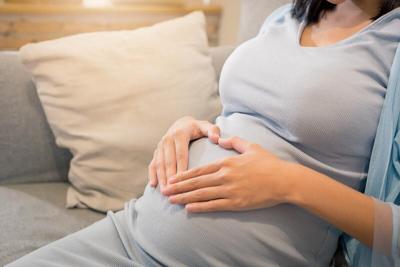Key Takeaways
A new test can predict the risk of miscarriage and help produce healthy pregnancies
The test looks for problems in a womanâs womb lining that increase her risk of miscarriage
Prior miscarriages can further increase the future risk of these problems
MONDAY, June 30, 2025 (HealthDay News) â An experimental test can predict a womanâs risk of miscarriage, based on problems in the womb lining that occur prior to pregnancy.
In some women, an essential biological process that prepares the endometrium for pregnancy doesnât progress properly, increasing the risk of miscarriage, researchers report in the journal .
Whatâs more, a prior miscarriage significantly increases the odds that a womanâs womb lining will respond abnormally in future menstrual cycles, researchers said. This explains why some women have multiple miscarriages.
Researchers have used these findings to develop and deploy a diagnostic test to measure a womanâs risk of miscarriage.
âThis is about identifying preventable miscarriages,â lead investigator , a research fellow with the University of Warwick Medical School in the U.K., said in a news release.
âMany women are told theyâve just had âbad luckâ, but our findings show that the womb itself may be setting the stage for pregnancy loss, even before conception takes place,â Muter added.
One woman given the new test, Holly Milikouris, went on to have two healthy children after experiencing five prior miscarriages.
The test showed that her womb had prepared poorly for pregnancy, affecting the development of her embryos. After undergoing treatment to counter this problem, Milikouris and her husband Chris now have 3-year-old George and 17-month-old Heidi.
âMy miscarriages were all 'missed,â which means there were no symptoms to let us know there was a problem,â Milikouris, a civil servant from Cheshire, said in a news release. âWe found out when I went for a scan and a grew to dread having scans.â
She said she and her husband felt lost and were beginning to accept that she might never carry a pregnancy to term.
âThe treatments that typically can help women who have experienced miscarriages hadnât worked for us and each time we tried again we felt like we were rolling a dice with the babyâs life,â Milikouris said.
âBeing given the opportunity to take part in this trial was life changing,â she said. âFor the first time the results of my biopsy were normal, and we went on to have not one, but two successful pregnancies.â
This research focuses on the âdecidual reaction,â a process that transforms the womb lining (endometrium) into tissue that will support implantation of an embryo during conception.
When the decidual reaction doesnât fully play out or develops abnormally, it creates an unstable environment in the womb, researchers said. Embryos can still implant, but the risk of bleeding and early pregnancy loss is higher.
For the study, researchers analyzed 1,500 biopsies from more than 1,300 women to examine how the decidual reaction played out during their menstrual cycles.
A stalled decidual reaction reduced the likelihood of pregnancy resulting in a live birth by 48% to 58%, researchers found.
Further, the chances of an abnormal decidual reaction arenât random. This problem recurs across menstrual cycles for some women at a rate far greater than chance would predict, suggesting a consistent and potentially preventable cause of miscarriage, researchers said.
In addition, women whoâd experienced one miscarriage were significantly more likely to have abnormal decidual reactions in future menstrual cycles, results show.
âThis study shows that each miscarriage increases the risk of an embryo implantation in an abnormal womb lining, regardless of age,â senior researcher , a professor of obstetrics and gynecology at the University of Warwick, said in a news release.
Brosens noted that chromosomal errors in embryos also are involved in miscarriage risk.
âThus, the frequency of one of two events â abnormal embryo or abnormal decidual reaction â happening over hundreds of menstrual cycles determines the likelihood of miscarriage in each individual woman,â Brosens said. âImportantly, we now have the tools to screen for the risk of preventable miscarriage and to evaluate treatments that improve the womb lining before pregnancy.â
 A diagnostic test based on this research is now being evaluated, and has already been used in the care of more than 1,000 patients, researchers said.
âI think this research and treatment is going to help a lot of women out there,â said Dr. Tajinin Islam, a psychiatrist from Chester who underwent the new test after several failed pregnancies.
Islam now has a healthy 16-month-old son, Mivaan, whom she describes as a âblessing.â
âIâm over 40 and if I can have a baby, then other women with my condition can also find the reason behind why they are having miscarriages and go on to have a baby,â Islam said in a news release.Â
More information
The American Pregnancy Association has more on .
SOURCE: University of Warwick, news release, June 26, 2025
What This Means For You
Women whoâve experienced a miscarriage should ask their doctor about this new test of the decidual reaction.
